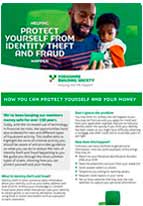Stay one step ahead
How to protect yourself from fraud and scams
Protecting you from fraud and scams
We've been keeping our members' money safe for over 160 years.
We'll guide you through the most common scams and show you how to protect yourself and your money.
What's on this page?
What to do if you’re concerned
How to get in touch
Report an issue
You can report fraud or security issues 24 hours a day using this form.
Authorised push payment scam reimbursement rules
The rules came into effect on 7 October 2024. This means customers that are victims of authorised push payment scams can get their money back.
What you need to know about the rules
Knowing the rules about getting your money back can help you understand if you have a valid claim.
Here are the key points of when the rules apply.
How to protect yourself from scams
You need to show that you have been careful and cooperative enough to protect yourself against scams.
Here’s how you can protect yourself.
We will assess every claim on a case-by-case basis, taking your personal circumstances into consideration.
When you might not get your money back
Types of Fraud and Scams

Savings guides
“Hi mum” scams: How to spot and avoid them

Savings guides
HMRC tax scam phone calls and messages: How to spot them

Savings guides
Winter fuel payment scams: How to spot and avoid them

Savings guides
Quishing: How to spot and avoid QR code scams

Savings guides
Parcel delivery scams: spotting and avoiding them

Savings guides
What is a money mule?
Doorstep scams
The scam:
How to spot a doorstep scam:
Stay one step ahead:
Holiday scams
The scam:
Holiday cancellation refund scams:
Holiday booking scams:
You may also get emails advertising offers or prices for package holidays or flights. When you click the link you’re directed to a fake website designed to get your financial information.
Stay one step ahead:
Impersonation scams
The scam:
These scams often begin with a phone call, text or email that appears to be from a trusted organisation. Criminals can use a tactic called ‘spoofing’ to make their call or text appear genuine. Spoofing clones the number or sender ID displayed on your phone. Criminals can even trick you by sending couriers to collect cards, PINs or valuables.
Recently, criminals have also started using social media to contact people. They even pretend to be friends and relatives. If you receive a text from someone asking for money, stop and think. If you can’t speak to them in person, it could be a scam.
How to spot an impersonation scam
Stay one step ahead:
Investment scams
The scam:
Criminals convince people to invest their money in commodities. These commodities can include property, gold or cryptocurrencies.
The commodities then turn out to be non-existent or worthless.
Scammers draw people in by:
How to spot an investment scam:
Stay one step ahead:
Invoice and Mandate scams
The scam:
How to spot an invoice and mandate scam:
Stay one step ahead:
Payment in Advance scams
The scam:
How to spot a payment in advance scam:
Stay one step ahead:
Purchase scams
The scam:
How to spot a potential purchase scam:
Stay one step ahead:
QR (Quishing) scams
The scam:
The scam:
Romance scams
The scam:
The scam often goes to great lengths to gain your trust and convince you you’re in a relationship. This will all happen before the criminal appeals to your compassionate side to ask for money. They will use language to manipulate, persuade and exploit you. These requests might be emotive. The criminal may claim they need money for medical care or to pay for transport costs to visit you.
How to spot a romance scam:
Stay one step ahead:
Stay one step ahead
How you can protect yourself from scams
Staying Safe Online
Follow the link below to find out more about using the internet safely and protecting yourself from identity theft and fraud.

